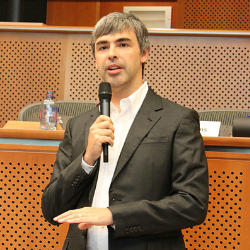
A company investing in another company is not really that interesting (unless you are heavily involved in Wall Street) yet the interesting part is that one of those companies is an internet giant and the others initials stand for California Life Company. Indeed, Google has just entered in the medical research market.
In a media briefing, Google announced that the new venture will research mostly in subjects related with aging and its related diseases. This new and independent company will research the cure for some of the most prevalent conditions among elderly, such as Alzheimer's or heart disease. In fact, in an interview with Time Magazine, Google CEO Larry Page (pictured) implied that dramatically extending human life is one of Calico’s main goals.
We may know Google for a range of interests that usually divert from medical treatments, yet the American company has shown in the past a certain attraction for health related topics. Google Health, released in 2008, was a cloud based service that allowed users to upload all their medical records and health data. With that information, Google created a centralized database that provided users with useful healthy tips and information, along with suggestions and warnings regarding medications. It was scrapped in 2011 but despite this unsuccessful program, Google also invested a few bucks in 23andMe a personal genomics and biotechnology company that provides rapid genetic testing.
This experience seems pretty much anecdotal. What then can Google bring to the table in a field in which it has close to no experience? Actually, Google's contribution to the firm is what has the research community is really excited about. This is because, even though it hasn't been formally announced yet, it is very likely that Google will bring statistics.
Google is already known for its vast array of statistical analyses and particularly for incorporating those mathematical tools in almost every part of its business. Not only search results are improved by powerful algorithms, but also their translation applications. Within the company, statistical research is part of the culture, with practices that range from personnel selection to optimization techniques for displaying the office munchies. That's right, Google researches candy. Considering this healthy love for statistical research, it wouldn't be shocking if part of that vast knowledge in data analysis ends up working in the name of health.
It is assumed, by many researchers and followers of Google, that big data will have an important weight in Calico. By merging data from Google's many sources with genomic information and the research generated at Calico, novel approaches to statistical modeling may shed light to the secrets of aging. How and when is anyone's guess, but most specialists agree that Calico can only benefit from Google's big data and statistics initiatives. Besides, it is expected that Google will use data to decide which targets to focus on, as Larry Page himself discussed in his interview with Time Magazine.
'One of the things I thought was amazing is that if you solve cancer, you’d add about three years to people’s average life expectancy. We think of solving cancer as this huge thing that’ll totally change the world, but when you really take a step back and look at it, yeah, there are many, many tragic cases of cancer, and it’s very, very sad, but in the aggregate, it’s not as big an advance as you might think.'
This also illustrates one of the other advantages Google's research efforts will have: money. As Page discussed, Calico will not have one of most the common obstacles most research centers have. Google can aim their research efforts to some common diseases that aren't usually subject to funds or government support. Pneumonia and Influenza are among the top ten killers in the US, yet not many research is done on those diseases, simply because they're not as well funded as cancer. Neither will Calico be a part of a pharmaceutical company, so they won't waste time marketing already patented medicines.
But money has its limits. It will surely take years before we see any actual treatment come from Calico. Google's own estimates talk about 20 years. In the meantime, it will be great to see how a totally new approach to research works. It will be interesting to see if a data driven company can imbue its new medical facilities with the same culture that permeates its headquarters. On top of that it will be great to follow this experiment to discover whether a research facility without the usual constraints and with the support of a billionaire company can contribute meaningfully to the wellbeing of the world.




